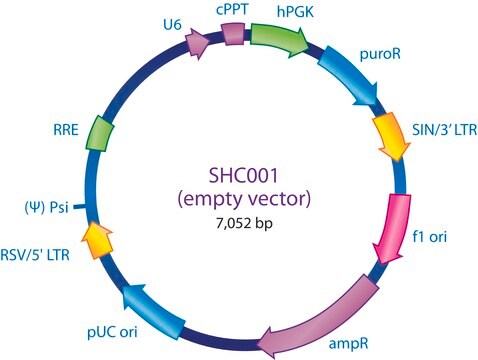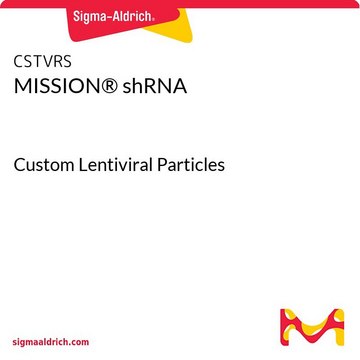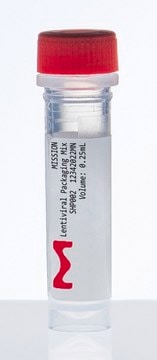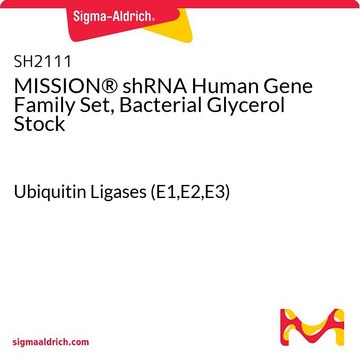SH0811
MISSION® shRNA Human Gene Family Set, Bacterial Glycerol Stock
Cytokines and Chemokines
Anmeldenzur Ansicht organisationsspezifischer und vertraglich vereinbarter Preise
Alle Fotos(1)
About This Item
UNSPSC-Code:
41106609
NACRES:
NA.51
Empfohlene Produkte
Produktlinie
MISSION®
Lagertemp.
−70°C
Angaben zum Gen
Suchen Sie nach ähnlichen Produkten? Aufrufen Leitfaden zum Produktvergleich
Allgemeine Beschreibung
The clones are sequenced-verified shRNA lentiviral plasmids (pLKO.1-puro) provided as 50 μl bacterial glycerol stocks (Terrific Broth, carbenicillin at 100 μg/ml and 15% glycerol). The set comes in 96-well plates that are barcoded for simple identification. A CD containing RefSeq, gene description, gene symbol, clone ID, hairpin sequence, locus link, and plate map positions are provided with the gene family set.
Sonstige Hinweise
Each MISSION shRNA clone is constructed within the lentivirus plasmid vector, pLKO.1-Puro, followed by transformation into Escherichia coli. The pLKO.1-Puro vector contains bacterial (ampicillin) and mammalian (puromycin) antibiotic resistance genes for selection of inserts in either bacterial or mammalian cell lines. Each clone set consists of an average of 3-5 constructs that have been designed against each target gene using a proprietary algorithm. Therefore, a range of knockdown efficiency, with at least one construct from each gene set being >70%, can be expected when using these clones. This allows one to examine the effect of loss of gene function over a large series of gene knockdown efficiencies. Each shRNA construct has been cloned and sequence verified to ensure a match to the target gene.
For a detailed listing of other available gene family sets, visit the gene family set website.
Number of Genes: 106, Number of Clones: 528
The exact gene and clone count at time of purchase may vary slightly as the TRC library is continually updated.
Rechtliche Hinweise
Use of this product is subject to one or more license agreements. For details, please see http://sigmaaldrich.com/missionlicense .
MISSION is a registered trademark of Merck KGaA, Darmstadt, Germany
Lagerklassenschlüssel
10 - Combustible liquids
WGK
WGK 3
Flammpunkt (°F)
Not applicable
Flammpunkt (°C)
Not applicable
Hier finden Sie alle aktuellen Versionen:
Analysenzertifikate (COA)
Lot/Batch Number
It looks like we've run into a problem, but you can still download Certificates of Analysis from our Dokumente section.
Wenn Sie Hilfe benötigen, wenden Sie sich bitte an Kundensupport
Besitzen Sie dieses Produkt bereits?
In der Dokumentenbibliothek finden Sie die Dokumentation zu den Produkten, die Sie kürzlich erworben haben.
Timothy N Trotter et al.
Cancer research, 80(15), 3088-3100 (2020-05-06)
IL26 is a unique amphipathic member of the IL10 family of cytokines that participates in inflammatory signaling through a canonical receptor pathway. It also directly binds DNA to facilitate cellular transduction and intracellular inflammatory signaling. Although IL26 has almost no
Paul Anderson
Nature immunology, 9(4), 353-359 (2008-03-20)
The cytokine-encoding messenger RNA (mRNA) molecules transcribed in the nucleus acquire a protein coat that facilitates nuclear export, influences cytoplasmic localization, and determines stability and translational competence. The composition of this coat is determined by sequence elements that recruit proteins
Vandana Tayal et al.
European journal of pharmacology, 579(1-3), 1-12 (2007-11-21)
Cytokines which comprise of a family of proteins--interleukins, lymphokines, monokines, interferons, and chemokines, are important components of the immune system. They act in concert with specific cytokine inhibitors and soluble cytokine receptors to regulate the human immune response. Their physiologic
The many roles of chemokines and chemokine receptors in inflammation.
Israel F Charo et al.
The New England journal of medicine, 354(6), 610-621 (2006-02-10)
Sheila A Stewart et al.
RNA (New York, N.Y.), 9(4), 493-501 (2003-03-22)
Genome-wide genetic approaches have proven useful for examining pathways of biological significance in model organisms such as Saccharomyces cerevisiae, Drosophila melanogastor, and Caenorhabditis elegans, but similar techniques have proven difficult to apply to mammalian systems. Although manipulation of the murine
Unser Team von Wissenschaftlern verfügt über Erfahrung in allen Forschungsbereichen einschließlich Life Science, Materialwissenschaften, chemischer Synthese, Chromatographie, Analytik und vielen mehr..
Setzen Sie sich mit dem technischen Dienst in Verbindung.







